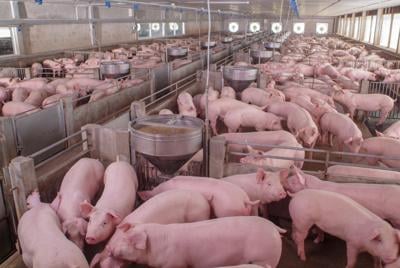
By Zeta Cross


(The Center Square) – By the end of February, the U.S. Supreme Court is expected to announce a decision that will determined how farmers can raise pigs.
Proposition 12 is a California ballot initiative that prohibits individual gestation pens for sows and practices that are used in the raising of veal calves. Prop 12 was passed by California voters in 2014. It was to go into effect on Jan. 1, 2022, but was halted be a federal judge until the Supreme Court decides on the matter.
The market power of California’s 40 million consumers will force farmers across the country and in Canada to comply with the California measure, unless the measure is overturned by the U.S. Supreme Court.
The Supreme Court decision may be the last stand for pig farmers who oppose mandatory open housing for gestating sows.
Michael Formica, chief legal strategist for the National Pork Producers Council, said California consumers buy 13% of the pork sold in the United States. When an Illinois farmer sells a pig to a processor, they have no control over where the meat winds up.
“The bacon can go to California, the pork chops might wind up in Chicago, the ham could go to Mexico,” Formica told The Center Square.
If Proposition 12 is permitted to go into effect, a California grocery store or a restaurant distributor will face fines and even jail time unless they can prove that the pork they buy was raised in a manner that is compliant with what is described in the California measure.
“The California market is so big that farmers will have to agree to allow California inspectors to cross state lines and come to their farms,” Formica said. “Farmers will be forced to comply.”
Opponents of the measure argue that Prop 12 violates the Commerce Clause of the U.S. Constitution. States are prohibited from regulating commerce outside their borders, they maintain. Critics also say consumers will pay higher prices for pork and producers will be penalized by having to remodel their barns and change their farming practices.
Formica told The Center Square that “vegans and Hollywood types” who have never been to a farm should not have the right to tell farmers outside of California how to run their livestock operations.
“There are Democrat-appointed justices who think that this, on its face … is just unconstitutional,” he said.
The justices peppered the attorneys with hypotheticals about the wider implications of the law.
“All the justices have real problems with what California wants to do,” Formica said. “They are struggling over how to address it.”
Some of the questions include whether consumers have the right to be informed about farming practices or whether consumers have more choices.
“There are less restrictive measures like labeling that could be taken,” Formica said. “The justices are concerned about what the implications of laws like this mean for relationships among the states.”
TELL YOUR FRIENDS ABOUT CITIZENS JOURNAL Help keep us publishing –PLEASE DONATE



